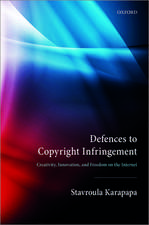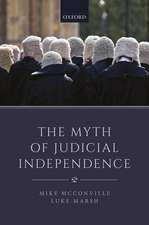Penality in the Underground: The IRA's Pursuit of Informers: Clarendon Studies in Criminology
Autor Ron Dudaien Limba Engleză Hardback – 29 iul 2022
Din seria Clarendon Studies in Criminology
- 30%
 Preț: 524.88 lei
Preț: 524.88 lei - 27%
 Preț: 539.99 lei
Preț: 539.99 lei - 30%
 Preț: 597.87 lei
Preț: 597.87 lei - 30%
 Preț: 539.03 lei
Preț: 539.03 lei - 30%
 Preț: 540.50 lei
Preț: 540.50 lei - 30%
 Preț: 518.78 lei
Preț: 518.78 lei - 30%
 Preț: 598.35 lei
Preț: 598.35 lei - 30%
 Preț: 521.83 lei
Preț: 521.83 lei - 30%
 Preț: 538.36 lei
Preț: 538.36 lei - 30%
 Preț: 537.95 lei
Preț: 537.95 lei - 30%
 Preț: 539.99 lei
Preț: 539.99 lei - 28%
 Preț: 499.76 lei
Preț: 499.76 lei - 30%
 Preț: 539.57 lei
Preț: 539.57 lei - 27%
 Preț: 500.43 lei
Preț: 500.43 lei - 19%
 Preț: 674.36 lei
Preț: 674.36 lei - 30%
 Preț: 659.34 lei
Preț: 659.34 lei - 30%
 Preț: 838.79 lei
Preț: 838.79 lei - 27%
 Preț: 658.11 lei
Preț: 658.11 lei - 25%
 Preț: 561.63 lei
Preț: 561.63 lei - 28%
 Preț: 424.05 lei
Preț: 424.05 lei - 31%
 Preț: 395.73 lei
Preț: 395.73 lei - 34%
 Preț: 579.34 lei
Preț: 579.34 lei - 14%
 Preț: 196.70 lei
Preț: 196.70 lei - 34%
 Preț: 600.54 lei
Preț: 600.54 lei - 30%
 Preț: 521.22 lei
Preț: 521.22 lei - 18%
 Preț: 339.31 lei
Preț: 339.31 lei - 19%
 Preț: 253.88 lei
Preț: 253.88 lei - 15%
 Preț: 395.89 lei
Preț: 395.89 lei - 34%
 Preț: 574.72 lei
Preț: 574.72 lei - 18%
 Preț: 301.83 lei
Preț: 301.83 lei - 34%
 Preț: 560.12 lei
Preț: 560.12 lei - 32%
 Preț: 466.28 lei
Preț: 466.28 lei - 34%
 Preț: 498.34 lei
Preț: 498.34 lei - 34%
 Preț: 522.99 lei
Preț: 522.99 lei - 30%
 Preț: 503.29 lei
Preț: 503.29 lei - 31%
 Preț: 413.86 lei
Preț: 413.86 lei - 34%
 Preț: 629.61 lei
Preț: 629.61 lei - 19%
 Preț: 566.44 lei
Preț: 566.44 lei - 9%
 Preț: 252.66 lei
Preț: 252.66 lei - 13%
 Preț: 167.56 lei
Preț: 167.56 lei - 31%
 Preț: 486.45 lei
Preț: 486.45 lei - 34%
 Preț: 633.17 lei
Preț: 633.17 lei - 30%
 Preț: 538.24 lei
Preț: 538.24 lei - 10%
 Preț: 270.63 lei
Preț: 270.63 lei - 31%
 Preț: 401.95 lei
Preț: 401.95 lei - 28%
 Preț: 473.39 lei
Preț: 473.39 lei
Preț: 496.73 lei
Preț vechi: 688.12 lei
-28% Nou
Puncte Express: 745
Preț estimativ în valută:
95.06€ • 103.22$ • 79.85£
95.06€ • 103.22$ • 79.85£
Carte disponibilă
Livrare economică 21-27 martie
Preluare comenzi: 021 569.72.76
Specificații
ISBN-13: 9780198759409
ISBN-10: 0198759401
Pagini: 256
Dimensiuni: 145 x 222 x 20 mm
Greutate: 0.44 kg
Editura: OUP OXFORD
Colecția OUP Oxford
Seria Clarendon Studies in Criminology
Locul publicării:Oxford, United Kingdom
ISBN-10: 0198759401
Pagini: 256
Dimensiuni: 145 x 222 x 20 mm
Greutate: 0.44 kg
Editura: OUP OXFORD
Colecția OUP Oxford
Seria Clarendon Studies in Criminology
Locul publicării:Oxford, United Kingdom
Recenzii
Dudai is to be applauded for developing a persuasively structured analytical framework that enables us to understand how the demonization and punishment of informers has served a variety of shifting functions in the Northern Ireland context. This framework, which also contributes to the development of a wider understanding of penality, can also be the basis for researching 'governing through informers' in other contexts of prolonged political violence.
The author is to be highly commended for producing a well-researched and engagingly written work on an at times opaque subject. The book illuminates and provides original research and analysis of a perennial though often hidden aspect of the conflict in Northern Ireland. It deserves to be read by a wide audience, including those with an interest in the inner workings of non-state armed groups, as well as in broader issues concerning conflict and transition in Northern Ireland.
Dudai's empirical work in this virtually unstudied area is breathtaking, and his theoretical exploration of the practice of informant killing upends our understanding of punishment and society.
There are few topics as complex and sensitive as the role of informers in political conflict and how armed groups respond to their activities. Using the IRA as a case-study, Ron Dudai has produced an outstanding study which does justice to that complexity and more. Drawing variously from criminology, sociology, law, anthropology, history and other fields - this is what proper interdisciplinary scholarship looks like. It is an intellectual tour de force and a joy to read. We would all like to write a book as good as this once in our lives. It will come to be seen as a classic.
This original theoretical and empirical account focuses on the IRA's response to informers. Dudai draws to good effect on a wide historical, political and cultural context, within which he situates his rigorous analysis, but his most important intellectual contribution is to the sociology of punishment. Dudai writes beautifully with clear and elegant prose and his book deserves to be read by audiences in a wide range of fields.
The author is to be highly commended for producing a well-researched and engagingly written work on an at times opaque subject. The book illuminates and provides original research and analysis of a perennial though often hidden aspect of the conflict in Northern Ireland. It deserves to be read by a wide audience, including those with an interest in the inner workings of non-state armed groups, as well as in broader issues concerning conflict and transition in Northern Ireland.
Dudai's empirical work in this virtually unstudied area is breathtaking, and his theoretical exploration of the practice of informant killing upends our understanding of punishment and society.
There are few topics as complex and sensitive as the role of informers in political conflict and how armed groups respond to their activities. Using the IRA as a case-study, Ron Dudai has produced an outstanding study which does justice to that complexity and more. Drawing variously from criminology, sociology, law, anthropology, history and other fields - this is what proper interdisciplinary scholarship looks like. It is an intellectual tour de force and a joy to read. We would all like to write a book as good as this once in our lives. It will come to be seen as a classic.
This original theoretical and empirical account focuses on the IRA's response to informers. Dudai draws to good effect on a wide historical, political and cultural context, within which he situates his rigorous analysis, but his most important intellectual contribution is to the sociology of punishment. Dudai writes beautifully with clear and elegant prose and his book deserves to be read by audiences in a wide range of fields.
Notă biografică
Ron Dudai is a senior lecturer at the department of sociology & anthropology, Ben Gurion University, Israel. His work has been published in leading journals including British Journal of Sociology, British Journal of Criminology, Law & Social Inquiry, and Punishment & Society. He was, among others, a member of the Martin Buber Society of Fellows at the Hebrew University of Jerusalem, and visiting scholar at the Mitchell Institute, Queen's University Belfast. He was awarded the Brian Williams Prize by the British Society of Criminology, and served as co-editor of the Journal of Human Rights Practice.









